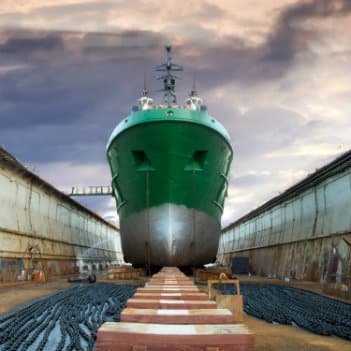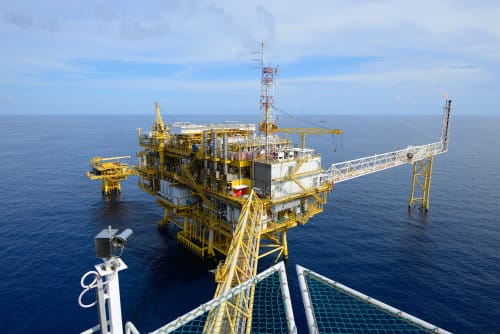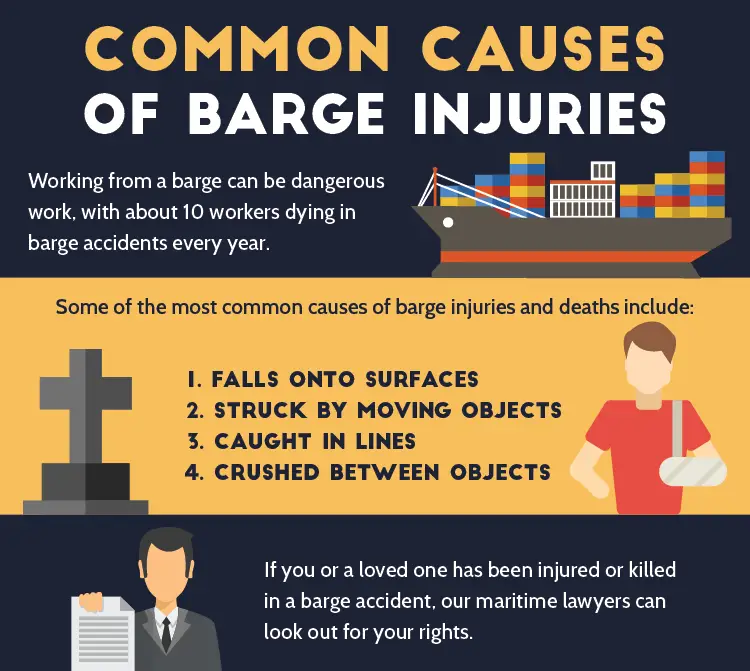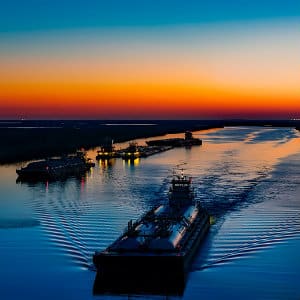If you’ve been injured in a workplace accident on a ship, dock, port, or another maritime setting, you may be wondering what to do next:
Contact us today to find out more about your rights in a free consultation.
Hundreds of thousands of workers are employed throughout America’s various ports, harbors, offshore operations, and other maritime settings. This type of work can be rewarding, as these employees play a crucial role in keeping America’s economy running and are able to provide a stable living for their families. However, maritime and offshore work can also be extremely dangerous.
Workers in these settings are routinely exposed to a wide range of on-the-job hazards which often lead to serious injuries. Although the nature of the work may be physically demanding and dangerous, many maritime work accidents are caused by the carelessness of an employer, co-worker, or the owner of the work vessel. Unfortunately, not every commercial water vessel meets acceptable safety standards.
Unlike workers in most other industries, sailors, seamen, crew members, and other workers who regularly contribute to the function of a vessel on navigable waters can hold their employers liable for negligence in workplace accidents. In order to seek these damages, you must meet the qualifications of a federal law called the Jones Act. Workers covered under this act can file lawsuits any time negligence contributes to a workplace injury.
If you were injured in an offshore or maritime accident and believe negligence was a factor, our offshore accident lawyer can help you explore your options.

Any maritime workplace has risks which could cause serious accidents, but proper safety procedures can greatly reduce these risks.
Barges are responsible for towing heavy loads of cargo through shallow waters. These workers have some of the highest injury rates, and about 10 barge workers are killed in accidents each year.
According to data from the US Coast Guard, the majority of severe injuries occur in the following types of barge accidents:
After any barge accident, it’s important to investigate how the accident may have been prevented.
Cargo ships transport extremely large quantities of goods across waterways. These ships are large and powerful, and cargo ship accidents often cause devastating injuries. Operators of these ships must always stay aware and make sure to follow all safety rules in order to avoid collisions, groundings, and other disasters.
There are also a variety of hazards on-board of the ship that are common to many types of maritime vessels and may lead to ship worker injuries:
Statistically, commercial fishing is the most dangerous occupation in the United States – with a nationwide fatality rate of 127 per 100,000 workers. Fishers can get caught in lines, fall overboard, be struck by moving parts in turbulent sea conditions, and may suffer repetitive motion injuries, sprains, and strains. While the occupation has it’s inherent risks, many severe fisher injuries could be prevented with the proper safety precautions.
Cruise ships are meant to offer a beautiful vacation escape, but these ships have a variety of common hazards which pose a risk both to passengers and crew members. If you suffered an injury on-board as either a passenger or an employee, it’s usually wise to speak with a lawyer with knowledge and experience in maritime law. Work injuries and personal injuries are both handled differently than in land-based workers’ compensation and personal injury claims.
Common cruise ship hazards include:
Maritime workers who primarily work on-shore at docks, harbors, and ports are not covered by the Jones Act. Instead, they have the option to file a Longshore and Harbor Workers’ Compensation claim. This claim provides similar benefits as other workers’ comp claims, but the process for claiming these benefits is different. You’ll be making your claim at the federal level and will be bound by the principles of maritime law instead of state law.
Cranes and derricks are powerful pieces of heavy machinery commonly used in maritime settings like offshore oil rigs, platforms, and work boats. Accidents involving these pieces of machinery can be catastrophic, resulting in severe injuries and possibly causing vessel disasters. Maritime employers have a responsibility to properly train employees in the operation of cranes and derricks and conduct regular inspection and maintenance to make sure they’re operating safely.
Many maritime workers are stationed on large permanent structures at sea, such as oil platforms and drilling rigs. These structures are built by maritime construction workers and involve installing massive pieces of structures far offshore. Construction is also one of the most dangerous industries in America, and adding the unique hazards of maritime work makes this line of work even more risky.
Accident risks in offshore construction include:

Along with the inherent risks of working at sea, oil rig and platform workers also work closely with potentially volatile substances. Oil rig fires and explosions frequently make national headlines, and these catastrophic accidents are usually preventable. The oil and gas industry must do more to ensure the safety of their employees. Far too many have suffered serious injuries and too many families have been forced to grieve after losing a loved one in an accident caused by negligence.
Forms of negligence that commonly lead to oil rig accidents include:
If you or a loved one suffered a serious or fatal injury on an offshore oil rig, you likely have grounds for a Jones Act claim.
If you’ve suffered an injury while working offshore or in a coastal maritime workplace, it’s important to be aware of your legal rights. These accidents cause serious life disruptions, both financial and personal. However, most injured maritime workers are overwhelmed by the process of filing for compensation, and many are unaware that they’re entitled to it.
Those who attempt to seek compensation on their own often run into difficulties when dealing with their employer and their insurance carrier. Employers and vessel owners both deserve to be held accountable when a preventable accident happens on their watch, but they have powerful resources and lawyers for fighting these claims.
To best protect yourself, we advise contacting an experienced maritime work injury lawyer to discuss the details of your accident and injuries. Our maritime lawyers will listen to your story in a free consultation, and help you decide what to do next.
Continue Reading:


 info@legalherald.com
info@legalherald.com